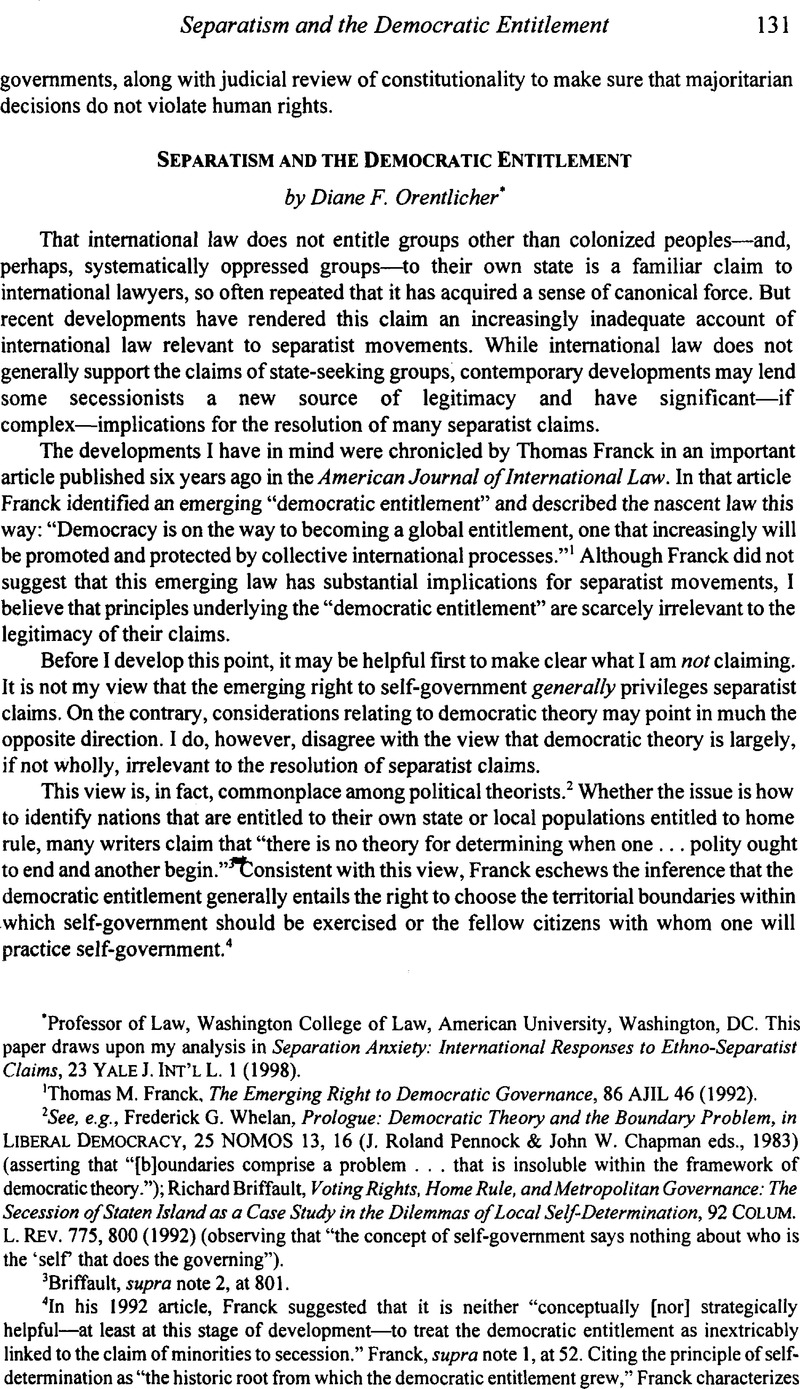No CrossRef data available.
Article contents
Separatism and the Democratic Entitlement
Published online by Cambridge University Press: 28 February 2017
Abstract

- Type
- Separatism and the Democratic Entitlement
- Information
- Copyright
- Copyright © American Society of International Law 1998
References
1 Franck, Thomas M., The Emerging Right to Democratic Governance, 86 AJIL 46 (1992)CrossRefGoogle Scholar.
2 See, e.g., Whelan, Frederick G., Prologue: Democratic Theory and the Boundary Problem, in Liberal Democracy, 25 NOMOS 13, 16 (Pennock, J. Roland & Chapman, John W. eds., 1983)Google Scholar (asserting that “[b]oundaries comprise a problem . . . that is insoluble within the framework of democratic theory.”); Briffault, Richard, Voting Rights, Home Rule, and Metropolitan Governance: The Secession of Staten Mandas a Case Study in the Dilemmas of Local Self Determination, 92 Colum. L. Rev. 775, 800 (1992)CrossRefGoogle Scholar (observing that “the concept of self-government says nothing about who is the ‘self that does the governing”).
3 Briffault, supra note 2, at 801.
4 In his 1992 article, Franck suggested that it is neither “conceptually [nor] strategically helpful—at least at this stage of development—to treat the democratic entitlement as inextricably linked to the claim of minorities to secession.” Franck, supra note 1, at 52. Citing the principle of self-determination as “the historic root from which the democratic entitlement grew,” Franck characterizes the principle in terms that assume the boundaries of an established political unit: “Self-determinatio postulates the right of a people organized in an established territory to determine its collective politici destiny in a democratic fashion and is therefore at the core of the democratic entitlement.” Id.
5 Id. at 47.
6 Raskin, Jamie B., Legal Aliens, Local Citizens: The Historical, Constitutional and Theoretic Meanings of Alien Suffrage, 141 U. Pa. L. Rev. 1391, 1444 (1993)CrossRefGoogle Scholar.
7 John Stuart Mill, Considerations on Representative Government (1861), quoted Utilitarianism, On Liberty, Considerations on Representative Government 392 (199 (emphasis added).
8 See generally Michelman, Frank I., Conceptions of Democracy in American Constitutional Argument: Voting Rights, 41 Fla. L. Rev. 443 (1989)Google Scholar; Raskin, supra note 6, at 1453-54; Sunstein, Cass R., Beyond the Republican Revival, 97 Yale L. J. 1539 (1988)CrossRefGoogle Scholar.
9 Sunstein, supra note 8, at 1554 (footnote omitted).
10 See id. at 1562, 1575. Sunstein argues that “[m]odern republicanism is thus not grounded in a belief in homogeneity; on the contrary, heterogeneity is necessary if republican systems are to work.” id. at 1576.
11 See id. at 1554-56.
l2 Id. at 1555 (footnote omitted).
13 Cf. id. at 1556 (observing that “the republican belief in deliberation about the common good is most easily sustained when there is homogeneity”).
14 MILL, supra note 7, at 394.
15 Id. at 391.
16 See Sunstein, supra note 8, at 1588-89.
17 See Buchanan, Allen, Secession: The Morality of Political Divorce from Fort Sumter to Lithuania and Quebec 100 (1991)Google Scholar; Sunstein, Cass R., Constitutionalism and Secession, 58 U. Chi. L. Rev. 633, 648-49 (1991)CrossRefGoogle Scholar.
18 Lord Acton, Nationality, in Essays on Freedom and Power 141, 165 (1862, 1972).
19 Id. at 160.
20 Id.




